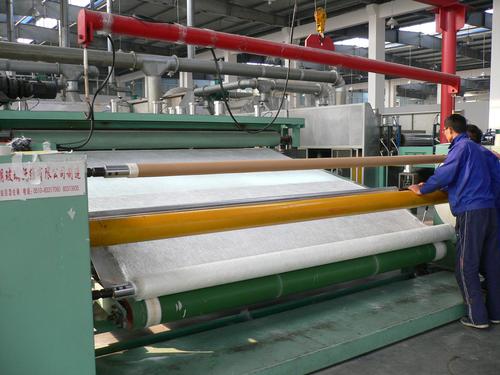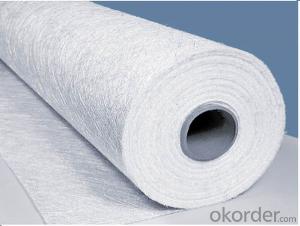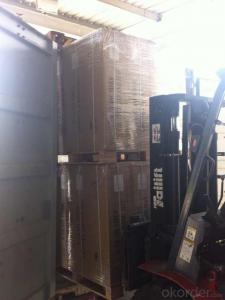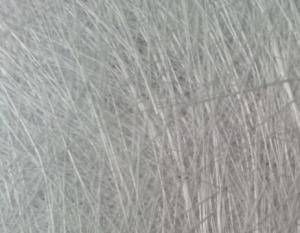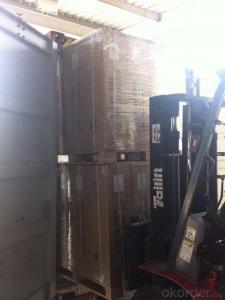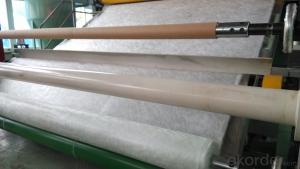Fiberglass Mat Tissue - E-Glass Chopped Strand Mat Emulsion Bonded-1040/1250/1270/1860/3200mm
- Loading Port:
- Shanghai
- Payment Terms:
- TT or LC
- Min Order Qty:
- -
- Supply Capability:
- 1500ton m²/month
OKorder Service Pledge
OKorder Financial Service
You Might Also Like
Specification of E-Glass Chopped Strand Mat
Property | Glass type | Weight(g/m2) | Width 200~3300 | Roll Weight | Moisture Content /% | Combustible Content /% | Breakage Strength /N |
Test Method | GB/T 1549 | ISO3374:2000 | ISO3374 | GB/T17470-1998 | ISO3344:1997 | ISO1887:1995 | ISO3342 |
EMC 80 | E-GLASS | 80±16 | ±5 | 6~50 | <0.2 | 13.6±0.35 | ≥200 |
EMC 100 | E-GLASS | 100±10 | ±5 | 6~65 | <0.2 | 9.5±0.35 | ≥170 |
EMC 150 | E-GLASS | 150±15 | ±5 | 6~97 | <0.2 | 8.0±0.35 | ≥40 |
EMC 225 | E-GLASS | 225±22 | ±5 | 6~150 | <0.2 | 5.0±0.6 | ≥60 |
EMC 300 | E-GLASS | 300±30 | ±5 | 6~180 | <0.2 | 4.0±0.6 | ≥90 |
EMC 450 | E-GLASS | 450±45 | ±5 | 6~180 | <0.2 | 3.8±0.6 | ≥120 |
EMC 600 | E-GLASS | 600±60 | ±5 | 6~240 | <0.2 | 3.6±0.6 | ≥150 |
EMC 900 | E-GLASS | 900±90 | ±5 | 6~190 | <0.2 | 3.4±0.6 | ≥180 |
Characteristics of Chopped strand mat
1.Uniform density ensures consisttent fiberglass content and mechanical properties of the composites products;
2.Uniform powder distribution ensures good mat integrity, little loose fibers and small roll diameter;
3.Excellent flexibility ensures good moldability with no spring back at sharp angles;
4.Fast and consistent wet-out speed in resins and rapid air lease reduce resin consumption and production cost, and enhances productivity and mechanical properties of the end products.
5, The composite products have high dry and wet tensile strength and good transparency.
6, Optional for high strength with stiff mat for panel laminating and midle strength with soft mat for hand layup.
Product description of Fiber Glass Powder Binder Chopped Strand Mat
Glass Fiber Emulsion Binder Chopped Strand Mat is an unwoven fabrics consisting of randomly distributed chopped strands held together with Emulsion Binder.
Emulsion Binder Chopped Strand Mats are compatible with unsaturated polyester, vinyl ester, phenol and epoxy resins.
The products are widely used in hand lay-up process and can also be used in compression molding and continuous laminating process and hand layup process. The typical end-use applications include various panels, boats, bathroom accessories, automotive parts and cooling towers.
FAQ:
1. Why Choose us?
CNBM is a stated own company, provide the guarantee for the best quality, best service and safety business.
2. How will we guarantee the quality?
a, ISO 9001-2008 quality control system;
b, Strict and regular quality control in production;
c, Inspeciation when loading into container before shippment;
d, Sample stock for one year for quality tracing and record.
3. What is your MOQ?
Our MOQ is one pallet.
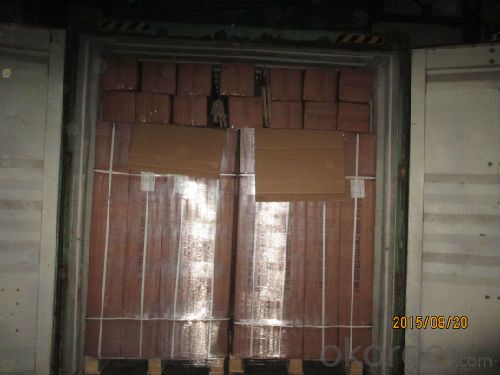
Package:
1, the Mat roll will be wrapped in PVC/PE film, then packed with carton boxes;
2, Vertically placed on bottom pallets by:
4 rolls*4 rolls or 4 rolls* 5rolls
Horizontally placed on upper pallets by:
3 rolls*4 rolls
3, the whole pallet will be fasten by PVC strips;
4, the whole pallets will be wrapped by strentchable PE film.
- Q: Can fiberglass mat tissue be used for insulation in oil refineries?
- No, fiberglass mat tissue is not suitable for insulation in oil refineries. Fiberglass mat tissue is primarily used in construction and automotive industries for reinforcement purposes. It is not designed to withstand the extreme temperatures and corrosive environments found in oil refineries. Instead, insulation materials used in oil refineries are typically made of fire-resistant and chemically resistant materials, such as mineral wool or calcium silicate. These materials are specifically engineered to provide optimal thermal insulation and safety in refinery operations.
- Q: Are there any environmental considerations when using fiberglass mat tissue?
- Yes, there are several environmental considerations when using fiberglass mat tissue. Firstly, the production of fiberglass mat tissue involves the use of energy and resources. The manufacturing process requires the extraction of raw materials, such as silica sand, limestone, and soda ash, which are non-renewable resources. The energy-intensive process of melting these materials at high temperatures also contributes to greenhouse gas emissions. Additionally, the production of fiberglass involves the use of chemicals, such as resins and binders, which can be harmful to the environment if not properly managed. These chemicals can potentially leach into water bodies or soil if not handled and disposed of correctly. Furthermore, fiberglass mat tissue is not biodegradable. Once it reaches the end of its lifespan, it can take hundreds of years to break down in a landfill. Improper disposal of fiberglass mat tissue can lead to environmental pollution and contribute to the growing problem of waste management. Lastly, the use of fiberglass mat tissue in certain applications, such as insulation or construction, can have energy efficiency implications. While fiberglass is an effective insulator, its production and installation may require additional energy inputs, such as the use of fossil fuels for transportation or heating during installation. To mitigate these environmental considerations, it is important to promote sustainable practices in the production and use of fiberglass mat tissue. This can include implementing energy-efficient manufacturing processes, reducing the use of harmful chemicals, promoting recycling or reuse of fiberglass materials, and exploring alternative materials that have a lower environmental impact.
- Q: How does the roll weight of fiberglass mat tissue affect its transportation?
- The roll weight of fiberglass mat tissue can have a significant impact on its transportation process. The weight of the roll determines the ease of handling and the logistics required for transportation. Firstly, a heavier roll weight can make it more challenging to move and handle the fiberglass mat tissue. If the roll is too heavy, it may require specialized equipment or machinery for loading and unloading, such as forklifts or cranes. This can add complexity and cost to the transportation process. Moreover, the weight of the roll also affects the packaging and storage requirements during transportation. Heavier rolls may require sturdier packaging materials and additional precautions to ensure their stability and prevent any damage during transit. This can include using pallets, strapping, or other securing methods to prevent the roll from shifting or falling during transportation. The weight of the roll also impacts the overall cost of transportation. Heavier rolls can increase shipping costs, as carriers often charge based on weight. Additionally, the weight of the roll can affect the number of rolls that can be transported in a single shipment, which can impact the efficiency and cost-effectiveness of the transportation process. In summary, the roll weight of fiberglass mat tissue plays a crucial role in its transportation. It affects the ease of handling, packaging requirements, and overall cost of transportation. Therefore, it is essential to consider the roll weight when planning and organizing the logistics for transporting fiberglass mat tissue.
- Q: How is fiberglass mat tissue used in the production of chemical reactors?
- Fiberglass mat tissue is used in the production of chemical reactors as a reinforcement material. It is typically applied to the inner surface of the reactor to provide structural strength, enhance resistance to corrosion, and improve overall durability. The fiberglass mat tissue acts as a barrier against chemical reactions, preventing leaks or damage to the reactor. Additionally, it helps maintain a stable temperature inside the reactor, ensuring efficient and safe chemical processes.
- Q: Can fiberglass mat tissue be used for wind turbine blades?
- Yes, fiberglass mat tissue can be used for wind turbine blades. Fiberglass mat tissue is a lightweight and strong material that is commonly used in the construction of wind turbine blades. It provides excellent strength-to-weight ratio and is resistant to corrosion, making it ideal for withstanding the harsh environmental conditions that wind turbine blades are exposed to. Additionally, fiberglass mat tissue can be easily molded into complex shapes, allowing for the creation of aerodynamically efficient wind turbine blades. Overall, the use of fiberglass mat tissue in wind turbine blades helps to improve their performance and durability.
- Q: What are the potential environmental impacts of using fiberglass mat tissue?
- The potential environmental impacts of using fiberglass mat tissue can vary depending on several factors. One potential impact is the extraction and production of the raw materials needed to manufacture fiberglass. The process of obtaining glass fibers involves mining and processing silica sand, which can lead to habitat destruction, soil erosion, and water pollution. Additionally, the production of glass fibers requires a significant amount of energy, which often comes from non-renewable fossil fuels, contributing to greenhouse gas emissions and climate change. Another environmental impact of using fiberglass mat tissue is the release of hazardous chemicals during the manufacturing process. Fiberglass production involves the use of resins, binders, and other chemicals that can be harmful to human health and the environment. These chemicals may be released into the air, water, or soil, potentially contaminating nearby ecosystems and posing a risk to wildlife and human populations. Furthermore, the disposal of fiberglass mat tissue at the end of its life cycle can also have environmental implications. Fiberglass is not easily biodegradable, and proper disposal methods are crucial to prevent it from ending up in landfills or being incinerated, both of which can release harmful substances into the environment. Recycling fiberglass can be challenging due to its complex composition, leading to a significant portion of it being discarded improperly. Lastly, the use of fiberglass mat tissue in certain applications, such as insulation or construction materials, can contribute to energy consumption and greenhouse gas emissions. For example, fiberglass insulation can require additional energy for manufacturing, transportation, and installation compared to alternative insulation materials like cellulose or mineral wool. In conclusion, the potential environmental impacts of using fiberglass mat tissue are diverse and range from habitat destruction and pollution during raw material extraction to the release of hazardous chemicals during manufacturing and difficulties in disposal and recycling. It is essential for manufacturers and consumers to consider these impacts and explore alternative materials and production processes that minimize harm to the environment.
- Q: How does fiberglass mat tissue enhance the strength of composite materials?
- The enhancement of composite material strength is greatly influenced by fiberglass mat tissue. Made up of thin fiberglass strands woven together, the tissue possesses a distinctive structure, with the strands randomly oriented and bonded by a resin binder. This unique structure offers several advantages to composite materials. Firstly, the random orientation of the fiberglass strands within the tissue aids in the even distribution of stress and load across the composite material. Consequently, when a force is exerted on the composite, the tissue prevents localized stress concentrations that could result in cracks or failure. By distributing stress, the fiberglass mat tissue enhances the overall strength and durability of the composite material. Secondly, the resin binder utilized in the fiberglass mat tissue serves as both a reinforcement and bonding agent. During the manufacturing process of the composite material, the resin binder infiltrates the fibers of the tissue, creating a robust and cohesive structure. This not only enhances the overall strength of the composite material but also improves its resistance to impact and fatigue. Moreover, the presence of fiberglass strands within the tissue augments the stiffness of the composite material. When combined with the resin binder, these strands establish a rigid framework that enhances the structural integrity of the composite. This increased stiffness renders the material more resistant to deformation and improves its load-bearing capabilities. Additionally, fiberglass mat tissue offers thermal and electrical insulation properties to composite materials. The fiberglass strands act as a barrier, minimizing heat transfer and preventing electrical conductivity. Consequently, the composite material becomes suitable for applications that require insulation, such as in electrical enclosures or thermal insulation panels. In conclusion, fiberglass mat tissue plays a critical role in enhancing the strength of composite materials by distributing stress, reinforcing the structure, increasing stiffness, and providing additional insulation properties. With its random orientation, resin binder, and unique characteristics, it is an indispensable component in the production of high-performance composites utilized across various industries, including aerospace, automotive, construction, and marine.
- Q: What are the different reinforcement patterns available for fiberglass mat tissue?
- There are several different reinforcement patterns available for fiberglass mat tissue, each offering unique benefits and characteristics. 1. Random Chopped Strand Mat (CSM): This is a widely used reinforcement pattern in fiberglass mat tissue. It consists of randomly chopped strands of fiberglass that are bound together with a binder. CSM provides good strength and stiffness properties, making it suitable for a wide range of applications. 2. Continuous Strand Mat (CSM): This reinforcement pattern consists of continuous strands of fiberglass that are evenly distributed and bound together with a binder. Continuous strand mat offers improved strength and stiffness compared to random chopped strand mat, making it ideal for applications that require higher performance. 3. Woven Roving: Woven roving is a reinforcement pattern that consists of interwoven bundles of fiberglass yarns. It provides excellent strength and impact resistance, making it suitable for applications that require high load-bearing capabilities. 4. Multiaxial Fabrics: Multiaxial fabrics are made up of multiple layers of fiberglass fibers that are oriented in different directions (usually at 0°, 90°, and ±45° angles). This reinforcement pattern offers balanced strength properties in multiple directions, making it ideal for applications that require isotropic properties. 5. Stitch-Bonded Fabrics: Stitch-bonded fabrics are made by mechanically stitching together layers of fiberglass fibers. This reinforcement pattern provides good drapability and conformability, making it suitable for applications that require complex shapes or curved surfaces. 6. Knitted Fabrics: Knitted fabrics are made by interlocking loops of fiberglass yarns. This reinforcement pattern offers excellent flexibility and ease of handling, making it suitable for applications that require conformability and flexibility. Each reinforcement pattern has its own advantages and is used in different applications based on the specific requirements of strength, stiffness, impact resistance, flexibility, or conformability. It is important to select the appropriate reinforcement pattern based on the desired end-use properties and manufacturing process.
- Q: Can fiberglass mat tissue be used for composite panel manufacturing?
- Yes, fiberglass mat tissue can be used for composite panel manufacturing. It is a common material choice for reinforcing composite panels due to its high strength, durability, and compatibility with various resin systems. The fiberglass mat tissue provides structural integrity and improved strength-to-weight ratio to the composite panel, making it suitable for a wide range of applications.
- Q: Can fiberglass mat tissue be used for making lightweight furniture?
- Yes, fiberglass mat tissue can be used for making lightweight furniture. Fiberglass mat tissue is a thin, lightweight material made from glass fibers that are bonded together with a resin. It is commonly used in various industries, including automotive, aerospace, and construction, for its excellent strength-to-weight ratio. When used in furniture manufacturing, fiberglass mat tissue can be layered and molded into different shapes and forms, providing structural support and rigidity while keeping the overall weight of the furniture low. This makes it an ideal choice for creating lightweight furniture pieces that are easy to move around and transport. Additionally, fiberglass mat tissue is highly durable and resistant to moisture, chemicals, and heat, making it suitable for both indoor and outdoor furniture applications. Its versatility allows furniture designers and manufacturers to create unique and innovative designs while maintaining the desired lightweight characteristics. However, it is important to note that the final product's quality and performance will also depend on the overall design, construction, and other materials used in combination with the fiberglass mat tissue. Therefore, proper engineering and manufacturing techniques should be employed to ensure the furniture's longevity, stability, and safety.
Send your message to us
Fiberglass Mat Tissue - E-Glass Chopped Strand Mat Emulsion Bonded-1040/1250/1270/1860/3200mm
- Loading Port:
- Shanghai
- Payment Terms:
- TT or LC
- Min Order Qty:
- -
- Supply Capability:
- 1500ton m²/month
OKorder Service Pledge
OKorder Financial Service
Similar products
Hot products
Hot Searches
Related keywords




